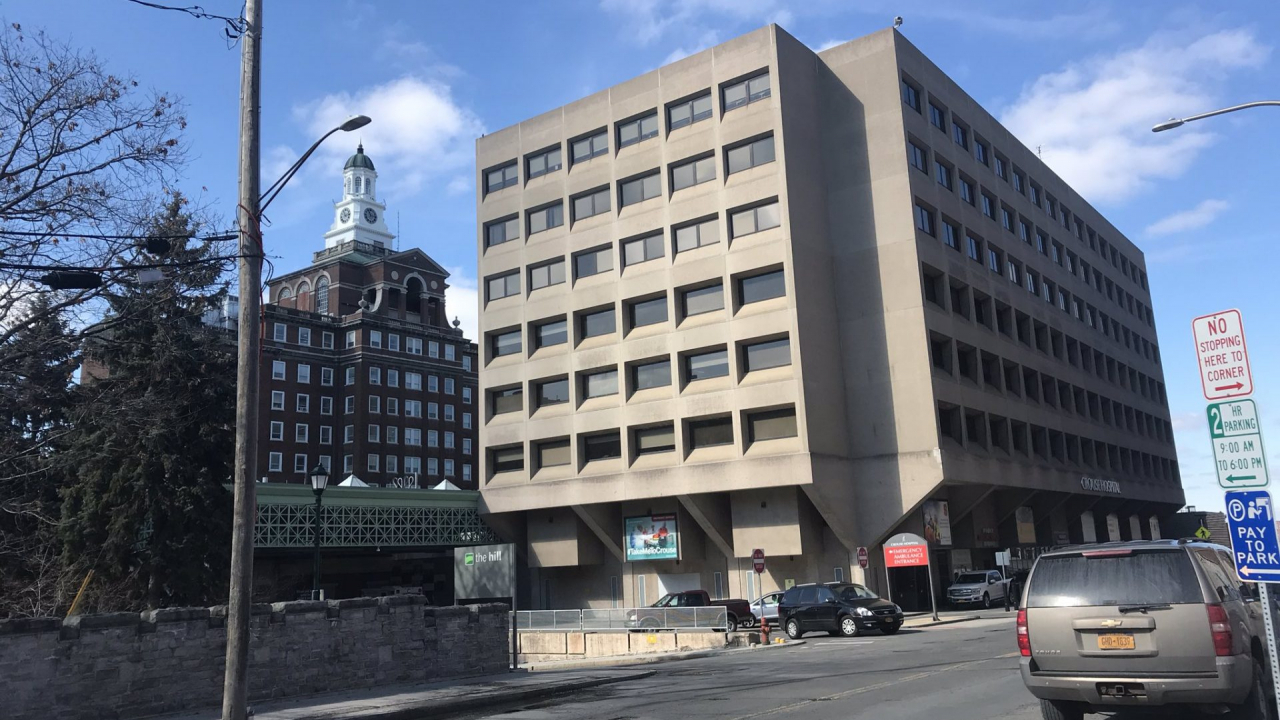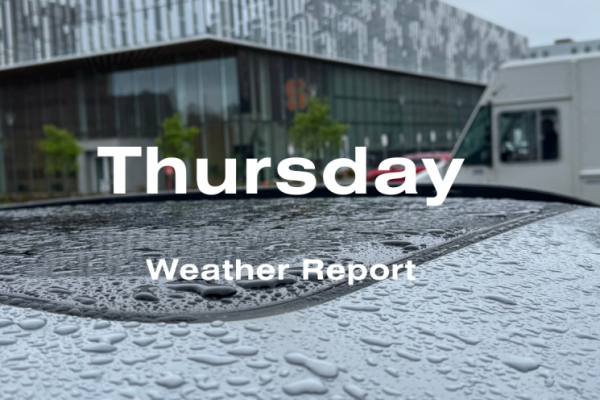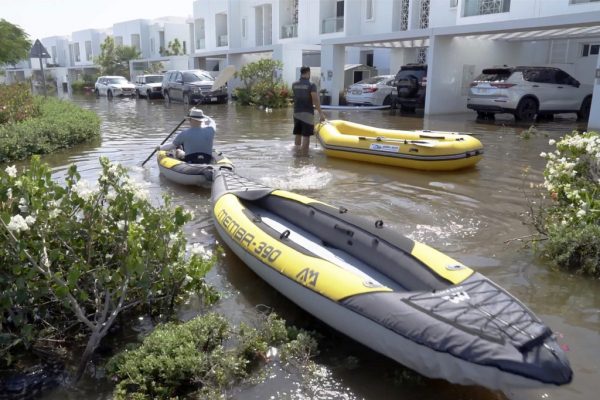
KYLE CLOHERTY COVID cases continue to climb in both Central New York and the United States. Now, medical facilities like Crouse Hospital are preparing for the second wave.Crouse Hospital, which recently had one COVID case, has seen 22 new patients come in as of last week. Carrie Berse, an administrator for Crouse Hospital, says they are prepared for more patients.
CARRIE BERSE “We do have capacity. All of the hospitals have to have a plan too for increasing capacity if we see a pretty dramatic surge, we don’t turn away obviously. So we can accommodate more people.”
CLOHERTY With the holidays right around the corner, many health officials are concerned about family gatherings. Carrie Berse gave a strong message about COVID risks during the holidays.
BERSE “Holiday times can be very seductive in terms of wanting to be together. If you can just have the discipline not to be with your family this year, it will mean that you will be with them in future years. If you’re together this year and get sick that may not be possible.”
CLOHERTY Health officials across the country continue to repeat one message: wear a mask, social distance, and wash your hands.
By Kyle Cloherty
Syracuse, N.Y. (NCC News)-
COVID-19 cases continue to climb in both Central New York and the United States. Medical facilities like Crouse Hospital are preparing for the second wave.
The hospital recently had one COVID-19 case, but as of last week, the hospital has seen 22 new patients come in. However, Crouse is prepared for the increase in patients.
“We do have capacity,” said Carrie Berse, an administrator for Crouse Hospital.
“All of the hospitals have to have a plan too for increasing capacity if we see a pretty dramatic surge, we don’t turn away obviously. So we can accommodate more people.”
With the holidays right around the corner, many health officials like Berse are concerned about potential risks with family gatherings.
“Holiday times can be very seductive in terms of wanting to be together. If you can just have the discipline not to be with your family this year, it will mean that you will be with them in future years. If you’re together this year and get sick, that may not be possible,” said Berse.
Health officials across the country continue to repeat one message: wear a mask, social distance, and wash your hands.
KYLE CLOHERTY Hi,sorry about that.
CARRIE BERSE Oh no, that’s okay. What happened?
CLOHERTY Honestly, I’m not even sure I’m a lot better at joining the zoom meetings instead of creating them, so it’s probably something on my side.
BERSE Okay. All right, well, I’m glad it worked out. So, um, so anyway, glad to help.
CLOHERTY Yeah, thank you. I appreciate you doing this interview with me.
BERSE Sure. Um, hopefully. We didn’t talk about too much. I mean, I know it has to do with COVID-19 Yeah, um, but I’m not a clinical person. I’m an admin in administration, I actually do all the fundraising for the hospital. So depending upon, I went, I did reach out to the director of communications here to see if he was available. He wasn’t and he’s fine with me doing an interview. But, um, I just want to make sure you knew just okay. So, like, I’m not in any kind of medical personnel.
CLOHERTY That’s completely fine. Okay. So yeah, you can just answer to however much you know, and that’s completely fine.
BERSE All righty. I appreciate that.
CLOHERTY Great. So the first question I have so obviously cases have gone up around Central New York, has there sort of been an uptick in case in hospitalizations, crowd sets, or the corresponded with the uptick uptick in cases around Central New York?
BERSE Yes, absolutely. There’s, um, as the the number of cases started to climb in Onondaga county and central New York, we did see an increase in COVID-19 positive patients, and actually pretty dramatic and pretty quick, we went from being down to one COVID-19, patient. Two, as of the middle of last week, we had 21 positive patients in house, not all of them in the intensive care unit. We have several different areas within the hospital where we care for COVID-19 patients, the sickest will go to you know, people on ventilators will have to be in the intensive care unit. But we went from having one patient in house to over 20 in a relatively short period of time.
CLOHERTY Wow. So is that’s where they’re like close to your cup full capacity for covid patients are you guys still have room to take more in the future?
BERSE We do have capacity. All of the hospitals have to have a plan to for increasing capacity if we see a pretty dramatic surge, we don’t turn anyone away, obviously. So we we can accommodate more people. The challenge that you have is sometimes with staffing, because COVID-19 patients, anybody who’s in the hospital tends to be fairly sick with with some exceptions, there are people here having babies and things like that, but when these days you tend you get admitted to a hospital, you know, there you have to be fairly under the weather, say and um and then
So an intensive care patients and patients who need to be on ventilators require a lot of resources in terms of nurses and physicians and respiratory attacks and things like that, too. So I think the challenge isn’t necessarily available beds, it’s just sometimes it could be a matter of having enough staff.
CLOHERTY Okay. So then obviously, we’ve been living with the virus for a while now, do you and the hospital feel like you’re more better prepared to handle cases and sort of treat patients now than say, when the first bike happened in New York in March?
BERSE Absolutely. When the pandemic first hitless in the spring, we really didn’t know what we, I don’t want to say we weren’t prepared, the hospital itself is prepared for any kind of an emergency, that might be a public health crisis that might happen. And we drill for these types of things. And we train staff for these types of things. It’s just in the very beginning, we really didn’t know what to expect.
And we also, we saw a lot of sicker patients. It’s not that these COVID-19 patients aren’t sick. But we’ve learned a lot of important lessons. When I say we Central New York, New York state the nation in terms of how to care for these folks, not necessarily we Crouse hospital, but so we’re much better prepared this time around, although as I said, we were we can pretty much deal with anything that comes through the doors. But this time, it’s some don’t want to say it’s been easier. The problem is people are tired now. They’ve been at this for a long time. So but it’s maybe perhaps more manageable.
I’m not on the front lines, and my
I am in awe of what the people on the front lines are doing these days.
CLOHERTY Yeah, of course. So have you has the sort of demographics been similar now as to before sort of older patients or people with underlying symptoms? Or has there been any sort of different trends that you guys have seen?
BERSE Well, one also a difference between when the pandemic first started, and now, I’m sure you’re familiar with what happened with nursing homes early on.
So that created a lot of issues for the hospitals. And now all of that’s been worked out. We’re seeing patients at all ages. And you know, from being a Syracuse University student, that the university experienced the spike now that just before they started sending students home,
all because I think younger people originally thought that they would somehow be immune from it. But really, anybody is susceptible, especially people with underlying health conditions. And a young person can have asthma, obesity, you know, all of the things that create issues for older folks, too. So I don’t have specific statistics, the people who,
unfortunately, succumb to the disease, I believe, have tended to be the older folks. But in terms of people who have been testing positive, I think it’s I don’t have statistics, but it’s, I think it’s pretty spread out. Yeah, amongst all the age groups.
CLOHERTY Okay. And then so for my last question, a lot of talk is about the upcoming holidays with Thanksgiving and Christmas, right around the corner. Is the hospital sort of doing things to prepare for that? And then what would be sort of a message to, I guess, residents of Syracuse for this upcoming holiday season?
BERSE Well, first and foremost, we’re constantly reminding people about the importance of mask wearing and social distancing. So that’s critical, whether the holidays were upon us or not, we recognize that it’s more of a challenge. Now, in terms of social distancing. A lot of us were outside during the good weather. And we were very blessed here in Central New York, that we actually had good weather right into November. So we were very fortunate in that. So we’re continuing to remind people about the importance of wearing a mask importance of things of social being socially distant. We’re also strongly encouraging with within our workforce, but also out in the community, we join in the recommendations that people limit the size of their holiday gatherings. Just because you are comfortable with someone and you’re related to somebody doesn’t mean that they’re coming into your home without a mask, not being socially distant is a good idea. We’re asking people to strongly consider limiting and I know the governor has put some restrictions on the number of people who can gather together in New York State, but we’re seriously asking people to limit their holiday celebrations to the people who live in their household. And that’s important for all of us, but also our staff. Because once again, going back to staffing, if our staff, members of our staff gets sick over the holidays, that’s obviously going to have an impact on anything that might follow.
We suspect
that there may be an uptick after the holidays too, because you’re going to have people together. And maybe some of them not following the guidelines, it’s and also the cold weather, it’s really starting to set in here in the northeast. So
definitely a challenging situation, we’re also requiring, recommending strongly that people get flu shots. Not that the flu shot will protect you from COVID-19. But it’ll help prevent you from getting sick and then needing to use medical slash hospital resources. So when you asked about capacity before, we’re trying to make sure that people don’t get the flu and have to be admitted to the hospital. So at least if we can keep flu patients out of the hospitals, it’ll give us more capacity to so also hand washing, very important, practicing all of the things that we’ve been told throughout the entire pandemic, but it’s it’s holiday times can be very seductive in terms of wanting to be together. There was somebody I saw on the news the other night, who said, if you can just have the discipline not to be with your family this year, it will mean that you’ll be with them in future years. If you’re together this year and get sick that may not be possible. So yeah.
CLOHERTY Well, that’s all the questions I have. Just thank you very much for doing this interview with me. I definitely appreciate it.
BERSE Oh, well, I hope it was helpful and I wish you and your family a wonderful holiday celebration and everybody say Roland say yes Same to you guys. Have a great holiday and beside Thanks. Thanks a lot. Take care. Bye bye.




